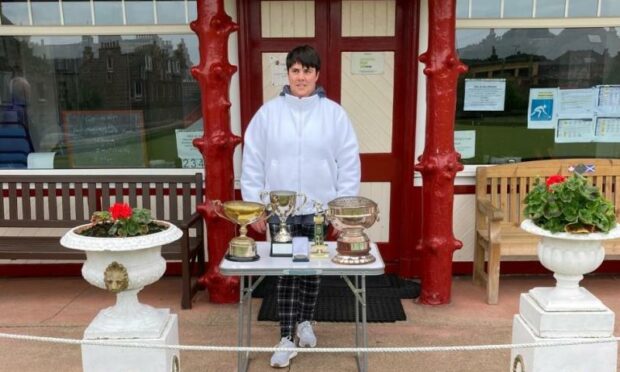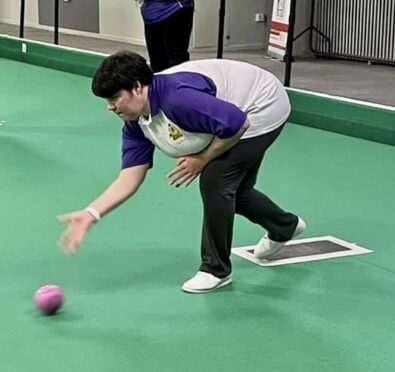Zoe Kane capped off a fine year by finishing runner up in Scottish Disability Sport’s Scottish Indoor Bowls Championships.
Her indoor success follows her wins in the Peterhead Club Championships and SDS’s National Lawn Bowl Championships.
Kane, 32, started playing bowls after making the move from swimming and judo – sports that she represented Team GB in at the Special Olympics.
She was introduced to bowls through Inspire, a charity that supports people with additional support needs, and quickly picked up the game.
Kane used her experience coaching boccia as a foundation to learning the skills and techniques of bowls as well as being taken under the wing of her mentor, Tom Buchan and Regional Academy Disabilities Lawn Bowls coach, Ian Hepworth.
Her success in bowls comes as no surprise as Kane excelled at the Special Olympics, winning gold and silver in swimming and bronze in judo.
Kane credits her losses as a key factor to why she goes on to win championships and titles.
She explained: “I’m very happy with my achievements. I always do my best, but in bowls I learn more from when I lose.
“It shows me what I can improve on to try and win next time. At the Buchan club championship, I lost in the semi-final, but next time I will have improved and hopefully be in the final.”
Kane would like to thank her work for allowing her to take time off to go and compete as well as those who travelled to her competitions to support her.
Inclusivity in sport
Kane competes and trains in mainstream sport as well as competitions for people with additional support needs.
She believes her love of sport is rooted in the inclusive opportunities that exist in her local area.
She said: “I love sport because its about mixing with other people with learning disabilities or people in mainstream.”
Kane receives the support of Grampian Disability Sport, a local branch of Scottish Disability Sport.
Grampian Disability Sport works to make sure that mainstream sports are as inclusive as possible by providing training and equipment if it’s needed.
The organisation also creates opportunities that are specifically tailored to people with disabilities.
Claire McDonald is chairwoman of Grampian Disability Sport and believes that Kane’s achievements is proof of how important it is for sport become more inclusive.
She said: “Zoe has come through the ranks in various sports and is an all-round talent.
“She has been able to move from different sports because the opportunities have been there for her. She has been able to go and access different sports as her interests have changed.
“Zoe is a brilliant ambassador for showing that if you want to be involved in sport there are opportunities out there which we can provide support with.
“We are here to make sports more inclusive, or to make changes or adaptations to allow people with disabilities to take part.”
Did you know we have an activity directory to show what sports/physical activities are on in Grampian?
Check it out at https://t.co/bIEfd2ZMXl ⚽️🏀🏓🎾🚴
If your inclusive club or session isn't on our website, please add it to our database at https://t.co/R2I99V9Jr7 pic.twitter.com/MhN3PlLPp0
— Grampian Disability Sport (@SDSGrampian) October 13, 2021
McDonald believes that the biggest hurdle to making sport more inclusive is the perception barriers that some people have towards those with additional support needs.
She said: “People who aren’t involved think it’s quite difficult to be inclusive, but it really isn’t.
“It’s about having an open mind and creating a welcoming environment for anyone to participate.
“Sports clubs and organisations need to support each individual rather than just making assumptions about what disabled people can or cannot do.
“I think as a society we need to do better in that way and then that will be reflected in our sporting environments too.”

